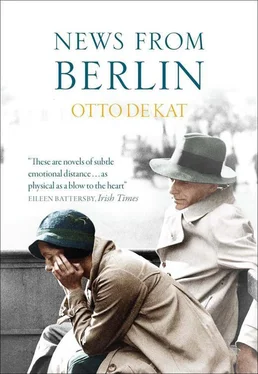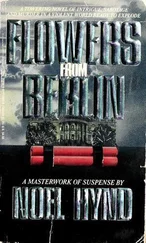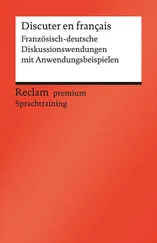She was struck by the silence in the house. Where was his wife? The room he showed her into was a riot of cosiness, with lace doilies on the tables, an upright piano, walls covered in framed watercolours and photographs of gentlefolk in nineteenth-century poses. There were lamps with pastel-coloured shades, flower-filled vases, a fireplace with neatly stacked logs alongside, all of which she remarked without taking it in. She had no time to waste. She was afraid she was too late.
The days had passed in unbearable suspense and vacillation. She had not said anything to Carl. He had likewise avoided the subject. How odd not to breathe a word about what was going through your mind all day and all night. Carl Regendorf, on secondment to an organisation involved in Radio Free India: broadcasts of freedom fighters in folk costumes seeking to undermine the British Raj. Their leader, a dark-skinned Indian who had shaken hands with Ribbentrop during a press conference, was in good cheer and excellent health, loudspeaker at the ready for the rant against the British oppressor. Carl had been present, fascinated by the zealotry, but above all disillusioned by the banal distortions of the truth. Over at the ministry, secret meetings were being held all the time to discuss the impending massacre and how to inveigle a way into international acquiescence. Encroaching on the edges of a redrawn map of Europe was the dawn of a new, everlasting empire. Russia, Africa, India, it would not be long now.
As long as Trott stayed put, so would he, but he was finding it increasingly difficult to stick by his resolve. The hypocrisy had assumed such proportions that he took to dropping in at Trott’s office from time to time, to regale him with a mime show. Using a range of crazed grimaces and gesticulations, he imitated the antics of the regime’s top dogs and ridiculed the insanity of everyday reality. Trott was highly amused by this, and communicated his responses in basic sign language, mindful of any microphones that might be concealed in lamps or ceilings. It was resistance in miniature, a scuffle in a soap bubble. But it allowed them to breathe.
*
In the early morning of that Thursday, as every Thursday, the bells of the nearby church rang out. Practice runs by the carilloneur, who favoured a slow, penetrating rhythm. Emma loved hearing the peals that reminded her so strongly of her schooldays in Leeuwarden.
She had seen the sun slanting into her garden, she had wished her neighbour good morning when he put his hand up over the hedge, she had refreshed the date on Carl’s desk calendar: June 19. Another three days to go. Then she had shaken herself awake, wheeled out her bicycle. Carl had left for work long since. She would tell Wapenaar, the secret had become too heavy to bear. It seemed less and less likely that her father had done anything, because if he had he would have found some way of letting her know. No, something must have happened to make him decide against passing on the information. Could it be something to do with that girlfriend of his? Emma’s revulsion at her father’s infidelity had barely abated. And it had reopened an old issue. The unforeseen separation from her father and mother, the way she had been left behind at her grandparents’ home. Her father had promised that they would take her with them wherever they went, but it was a lie, he had broken his promise, and the hurt had not healed well. She was the offspring of diplomats, which made her homeless. That was how she was feeling these past days.
But Wapenaar would sound the alarm, she was certain. Telegrams would be sent all over the place via Sweden, the Russians would receive warning. It would be just in the nick of time, it had to be. The race against the clock loomed over her like an unbeatable monster of velocity. She pedalled with suppressed rage and fear, her legs and feet in constant, forceful motion. Emma covered the distance in half the time it had taken her before. The lanes she had lingered over then, fraught with indecision, now flew past. She was blind to them as she cycled past one landmark after another, turning left and right unerringly, and not reducing speed until she swerved into Wapenaar’s driveway, with pounding heart but scarcely out of breath.
He placed the coffee cup in front of her, and looked at her calmly.
“Emma Verschuur, no, I should say Mrs Regendorf, how are you? And your husband? Still at the Foreign Office?”
She nodded, came straight to the point, told him about the operation, the date, the reliability of her source: Carl.
She listened for sounds in the house that were not there. No footfalls, no creaking floorboards, no doors being opened or closed. Midges danced behind the windowpanes. Outside, the neighbours’ dog started barking.
Wapenaar sat facing her. Defendant and judge, in abeyance of the verdict. Surrounding her were Carl, Watse, Trott, her father and mother, all waiting with her. Then came his questions, the most amicable cross-examination you could imagine. At last someone who would do something, take action. But there was no verdict. Wapenaar thanked her, showed her out, raised his hand as she cycled away, followed her with his eyes.
The return journey through Grunewald to Dahlem was the worst. Emma shivered as though she had a fever. The verdict, if any, was hers to reach. The alert would course through the circuit of diplomats and politicians, coded messages would be placed on the desks of ambassadors: Operation Barbarossa, June 22. Who else knew about this in Moscow, or in Berlin, or in Berne, London, Washington and Ankara? Was it true, was it all about to begin, or was it an unexploded bomb, an airman’s signal high in the sky, was it Zero Hour, or perhaps not after all? The Swedes would have picked up the news somewhere, no, the Swiss, it came from a trustworthy source in Berlin. Who said that, let them come forward, we know nothing, is it a trap, a stab in the back, an act of despair?
How long before it reaches Prinz-Albrecht-Strasse, how long before her name crops up, and Carl’s name – one week, two, a month perhaps?
A car was speeding along the lanes of Dahlem, with the all too familiar squeal of tyres taking sharp corners. Elbows jutting nonchalantly from the windows, shiny long coats with wide belts. The siren would not be switched off when they blocked the entrance with their squad car. There would be pounding on the door as the violence burst in on their lives, never to leave.
Emma cycled home in a cloud of fantasy and conjecture, and of bitter visions.
Would you switch the wireless on, Matteous?
She had no idea of the time, could be morning, could be evening. Probably evening, she thought. Kate had been in bed with a high fever for the past three days. Matteous nursed her to the best of his ability, fetching glasses of water, laying damp cloths on her forehead, standing guard by the bedroom door. Everything was turned on its head: she in bed, he beside it. Kate talked in her sleep, sounding delirious. Matteous listened to her nocturnal ramblings, and waited. When she was awake she wanted to get out of bed, but could not. She had lost all power over her arms and legs. She had become the child of Matteous, who watched over her and rocked her cradle. Gone was her will and her courage, her body abided by its own rules. There was no way she could go to a minister, or to the Queen.
Churchill’s voice wafted through the room. In Kate’s head everything sounded as if it came from twice as far away, but the meaning was clear. She knew what he was announcing, she had known for the past fortnight. But she had not heard it said in this way, had never grasped the full portent of it as she did now, in the terse, half-mumbled, half-sung speech by the English prime minister. He was saying the same things she had said to Carl: they would all be wiped out, all those mothers and children, and those poor ragged peasants having to fight with their bare hands against a terrible war machine, it was sheer betrayal, it was the slaughter of a people taken completely by surprise.
Читать дальше












